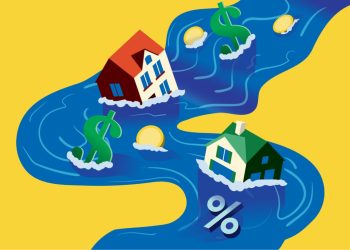RISMEDIA, Jan. 22, 2008-The recent housing price bubble has caused concern, with the post-2000 increase in house prices keeping the younger generation out of the housing market, particularly in California and Hawaii, Nevada, Florida and the east coast states from Maryland north. Yet in context, these increases are merely one facet of a larger transition on the horizon.
What is the generational housing bubble?
The massive Baby Boomer population (78 million) is poised to enter elderly years after four decades of surging through the housing market. The elderly sell many more homes than they buy and in the next decade the relatively smaller younger generation may not absorb all the homes released by the Baby Boomers sell-off.
The younger generation is not only smaller but its purchasing power has been eroded by the rapid increase in house prices in the recent boom. This surplus of potential home sellers is expected to create a prolonged buyers’ market–a sharp reversal from recent decades-and will likely cause prices to soften and decline.
Newly estimated data reported in this article show that roughly 2% of people of all ages younger than 70 sell homes each year, but the selling rate climbs far higher after age 75 . Meanwhile, the percent buying homes peaks at a much younger age, 30 to 34 (3.6%), before declining steadily into older ages.
After three decades of relative stability, the ratio of seniors to working age adults nationwide will increase by a total of 67% in the next two decades (2010 to 2030). After 2010 the leading edge of the 78m strong boomer population will pass age 65 and growth among the elderly population will substantially exceed that of younger adults, an unprecedented social and economic development that is expected to impact every state in the U.S.
How will it affect the states?
There are important differences between the states in the ages at which residents become net home sellers rather than buyers. The six earliest (where sellers dominate before age 60) are New York; Connecticut; New Jersey; Massachusetts; Illinois; Alaska. The latest (who sell on average after the age of 74) are Florida; Arizona; Nevada.
The study forecasts the time when the total number of annual sellers of all ages begins to outnumber the buyers, based on the growing number of seniors relative to younger adults, and applying typical per capita home buying rates at each age in each state.
States where sellers will dominate before 2015: New York; Connecticut; Massachusetts; Pennsylvania; West Virginia; North Dakota; Hawaii
States where sellers become surplus between 2016 – 2020: New Jersey; Rhode Island; Ohio; Iowa; Nebraska; Louisiana
A further 16 states, led by California and Illinois, develop a surplus of sellers in the 2020s .
Finally, another 21 states reach a position of surplus sellers after 2030 – including most of the Southern and Western states.
Consequences for the housing market
The market shift could begin as early as 2010, as the leading edge of the baby boom generation moves past the age of 65. As the number of sellers in the market begins to outnumber the buyers, it’s likely to lead to a drop in the housing market. It could mean:
– A collapse in home equity – for half the families in America, home equity amounts to more than half their net worth (this is especially important for the working class and most of the middle class)
– Young adults could get a bargain if they can wait long enough for prices to bottom out – but by waiting for the best price they could exacerbate the problem
– Many communities could acquire an excess of vacant and unsold properties, or they could be converted to rental units pending sale
– Property values will be assessed downward and this will diminish tax revenues available for municipal services
Planning for change
The coming generational transition in the housing market will upset the historic balance of buyers and sellers and demands action from state and local governments to reduce the impacts. They can:
– Monitor new construction and unsold inventory to prevent overbuilding
– Plan services and community designs to retain aging residents as long as possible, slowing their departure from the broader community
– Plan services to attract young households, such as better day care and schools, and more appealing amenities
– Attract new immigrants, who already account for 40% of US growth in homeownership this decade
– Invest in the economic capacity of youth, through higher education and job training – young adults with college degrees are more likely than those with high school degrees to become home owners, and they pay an average 64% higher price when better educated.
The impact of the aging boomer population will effect, not only housing prices, but transportation, land use and community development. It demands a response from urban planners and local officials that acknowledges the need to transform urban environments, and soon. Because this is a nationwide problem affecting a broad swath of the citizenry and with potential negative effects on the U.S. economy, the federal government should also assist in these solutions.
Aging and home ownership trends
A widely reported study by Mankiw and Weil (1989) predicted a 47% decline in house prices during the 1990s, based largely on their modeling of declining demand as baby boomers aged – an expectation that home investments would peak and decline after age 45. However, instead baby boomer demand for housing has grown into their 50s and house prices have doubled.
It has since proven that home ownership rates rise with age, and do not generally peak until after age 65. John Pitkin’s (1990) study of elderly homeownership was especially notable for showing how most variation in homeownership among older age cohorts over time is explained by demographic factors and inertia from prior decades, while current economic factors add small but significant effects at the margin.
Housing price changes and home ownership
In recent years, abnormally low mortgage rates have helped to inflate housing prices. This has encouraged even more home buying. In what might seem a paradox, when market fundamentals drive housing prices up, word of mouth and the fear that rising prices will make future purchases unaffordable amplify the trend. As a result, the number of buyers in the market increases to include both speculators and young adults accelerating their entry into homeownership.
This short-term housing bubble is now bursting in most of the U.S. Many analysts expect prices to decline through 2009 before beginning recovery. However, the eventual recovery in some states will be prevented by the downturn of the generational bubble that has been newly identified in this study.
Source: Journal of the American Planning Association (JAPA)
For more information, visit www.informaworld.com/japa.










